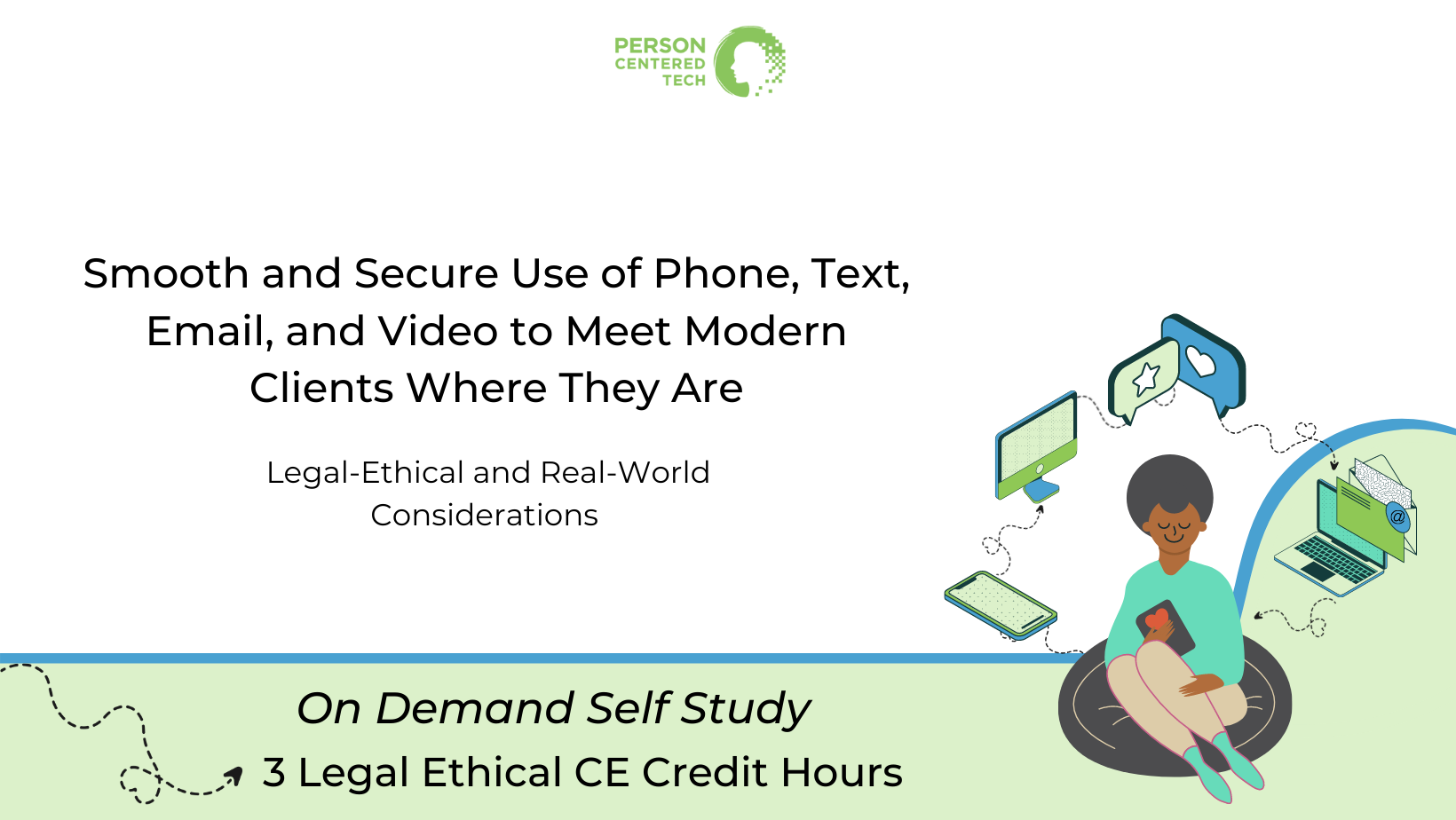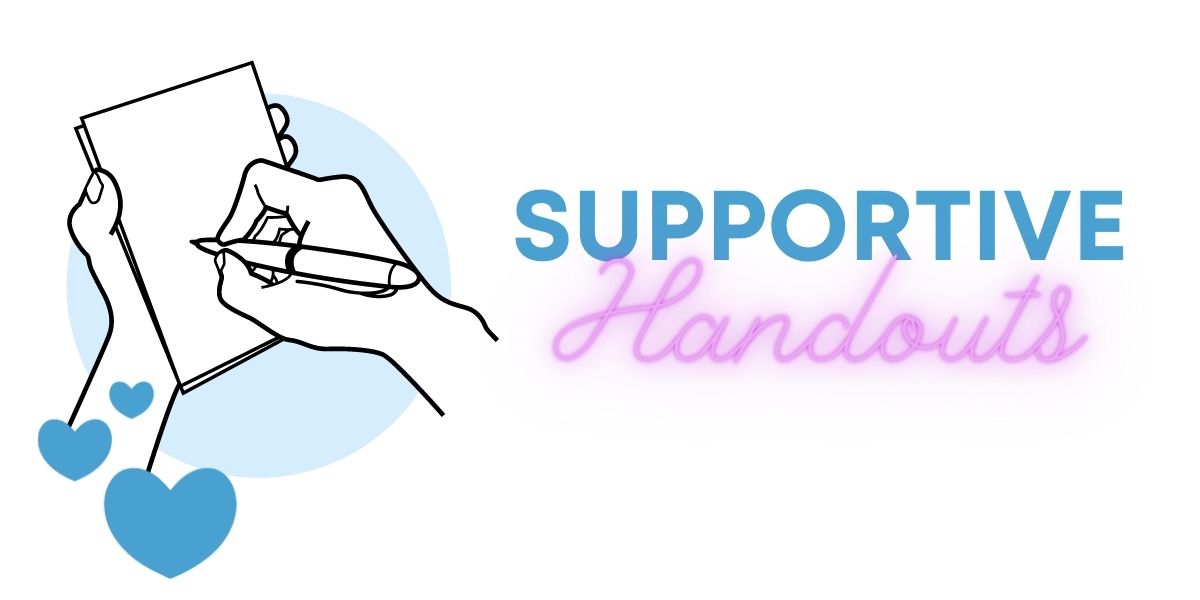3 Legal-Ethical CE Credit Hours on Affordable, Effective Tech Management On-demand self study course
Smooth and Secure Use of Phone, Text, Email, and Video to Meet Modern Clients Where They Are: Legal-Ethical and Real-World Considerations
Join Roy Huggins, LPC NCC and Liath Dalton as they discuss the legal-ethical considerations of modern communication channels and context of real world practice and client needs.
3 legal-ethical CE credit hours
On Demand Self Study

Therapists and clients are connected to each other anywhere they have Internet service and a sufficiently fancy electronic device. This is both exciting and terrifying.
Clients expect fast communication using systems they like to use, like email or text messaging. Therapists then find themselves having to balance client-centered approaches to connecting with clients vs. making those connections secure, legal, and ethical.
Who is this event for?
This course is designed for solo practitioners, group practice leaders, and group practice clinical staff members. It is also suitable for practices which consist of 100% in-person, 100% telehealth, or a mixture of in-person and telehealth treatment.
 In-person Practices
In-person Practices
 Hybrid Practices
Hybrid Practices
 Teletherapy Only Practices
Teletherapy Only Practices



Tech Selection
Choose email, texting, phone, and videoconferencing services that support HIPAA compliance and ethical decision making

HIPAA Compliance
Describe the administrative and technical measures clinicians must take to use email, texting, phone, and videoconferencing services ethically and in compliance with HIPAA.

Effective Clinical Boundaries
Manage ethical and effective boundaries around mobile, textual communication with clients

Plus a Communication Policy Checklist
PCT IS MY GO TO RESOURCE for my new fully Teletherapy practice. You all continue to impress on the comprehensive and up-to-date, not to mention user-friendly tools and information you provide to therapists etc like myself.

Practical Real-World Considerations
HIPAA doesn’t exist in a vacuum. We’ll approach a variety of real-world examples so you can feel confident applying concepts in your practice.
The world of healthcare technology services has matured considerably over the last 10 years. There are simple (and affordable) ways to do all the following legally and ethically:
- Handle initial contact from potential clients
- Exchange intake-related forms and info
- Perform administrative communications with the client, including billing
- Perform telehealth sessions
- Engage in therapist-client communication between sessions
- Send releases of records, superbills, and other highly sensitive documents to clients
Course Details
This introductory-level course for counselors, marriage and family therapists, psychologists, and clinical social workers will take a deep dive into the world of phone service, email, texting (all kinds!), and videoconferencing services to make sure attendees can easily make good legal-ethical decisions around both choosing and using such services with clients.
Title: Smooth and Secure Use of Phone, Text, Email, and Video to Meet Modern Clients Where They Are: Legal-Ethical and Real-World Considerations
Authors/Presenters: Roy Huggins, LPC NCC; Liath Dalton
CE Length: 3 CE hour
Legal-Ethical CE Hours: 3 legal-ethical CE hour
Educational Objectives:
- Choose email, texting, phone, and videoconferencing services that support HIPAA compliance and ethical decision making
- Describe the administrative and technical measures clinicians must take to use email, texting, phone, and videoconferencing services ethically and in compliance with HIPAA.
- Manage ethical and effective boundaries around mobile, textual communication with clients
Syllabus:
1. Using the Internet to communicate with clients
- Where is my client’s information? Easily and simply understanding what is happening to sensitive client info when we email, text, make phone calls, or do a video call.
- HIPAA and professional ethical standards around communicating by email, texting, phone, and videoconferencing.
- Using security policies to keep client information confidential and safe
2. Accommodating clients’ desire for unsecured emails, text messages, etc.
- Clients’ privacy choices under HIPAA
The 2 things to take care of when sending unsecured emails or texts to clients - Setting office policies and working with clients around safety in unsecured email and texting
- Client-centered secure alternatives to unsecure communications
3. Legal-ethical and practical issues in different client communication circumstances
- Initial contact to start services
- Exchange of intake-related forms and info
- Administrative communications with the client, including billing
- Telehealth sessions
- Therapist-client communication between sessions
- Releases of records, superbills, and other highly-sensitive documents to clients
4. Choosing services and using them to meet client needs
- What goes wrong when we use the wrong services
- Legal-ethical and client-centered needs in service selection
5. Record-Keeping Issues
- HIPAA standards around retaining information
- What to document about emails, texts, phone calls, and video sessions
- How to document emails, text messages, and any other textual communications
6. Boundaries and professionalism in email and texting
- Timing: When to exchange messages with clients?
- Content: What to say in messages exchanged with clients?
7. Using Communications Policies to guide clinician and client through Internet-based communications
Meet Our Presenters
Presented by Roy Huggins LPC, NCC with Liath Dalton

Roy Huggins, LPC NCC, is a counselor in private practice who also directs Person-Centered Tech. Roy worked as a professional Web developer for 7 years before changing paths and makes it his mission to grow clinicians’ understanding of the Internet and other electronic communications mediums for the future of our practices and our professions.
Roy is an adjunct instructor at the Portland State University Counseling program where he teaches Ethics and is a member of the Zur Institute advisory board. He has acted as a subject matter expert on HIPAA, security, and clinical use of technology for Counseling licensure boards, and both state and national mental health professional organizations. He has co-authored or authored 2 book chapters, and he routinely consults with mental health colleagues on ethical and practical issues surrounding tech in clinical practice. He served for 5 years on the board of the Oregon Mental Health Counselors Association and then the Oregon Counseling Association as the Technology Committee Chair.
He really likes this stuff.

Liath Dalton is PCT’s deputy director and a co-owner. Liath is especially passionate about helping therapists be resourced and supported in navigating the security compliance process and identifying the solutions and processes that meet the particular needs of their practices. Liath’s consultation area of expertise is focused on selecting the right combination of services and tech that not only meet the legal-ethical needs of mental health practices, but also the functionality, efficiency, and cost-effectiveness needs as well.
Additional Information
Citations:
-
- American Counseling Association. (2014). Code of Ethics . Alexandria, VA: Author.
- American Psychological Association. (2010). American Psychological Association Ethical Principles of Psychologists and Code of Conduct . Washington, DC: Author.
- Chiad, M. O. (2008). Structural and Linguistic Analysis of SMS Text Messages. Journal of Kerbala University , 6 (4).
- National Association of Social Workers. (2017). Code of Ethics . Washington, DC: Author.
- National Board for Certified Counselors. (2016). Code of Ethics . Greensboro, NC: Author.
- US Dept. of Health and Human Services. (2006). HIPAA Administrative Simplification . Washington, DC: Author.
- US Dept. of Health and Human Services. (2013). HIPAA Omnibus Final Rule . Washington, DC: Author.
Accuracy, Utility, and Risks Statement: The contents of this program are based primarily on publications and reports from the federal Department of Health and Human Services and consultation with experts on HIPAA Security standards and their implementation. Some interpretation and analysis presented is made by the presenter, in consultation with knowledgeable colleagues and expert consultants. Statements about applications to technology are according to presenter’s understanding of the technology at the time of the program. The presenter may not know how to apply all principles discussed to every technology type or product. This program discusses strategies for complying with HIPAA and covered ethics codes, and for improving security. It may not include information on all applicable state laws. Misapplication of the materials, or errors in the materials, could result in security problems, data breaches, or non-compliance with applicable laws or ethics codes.
Conflicts of Interest: None noted
Commercial Support: None
